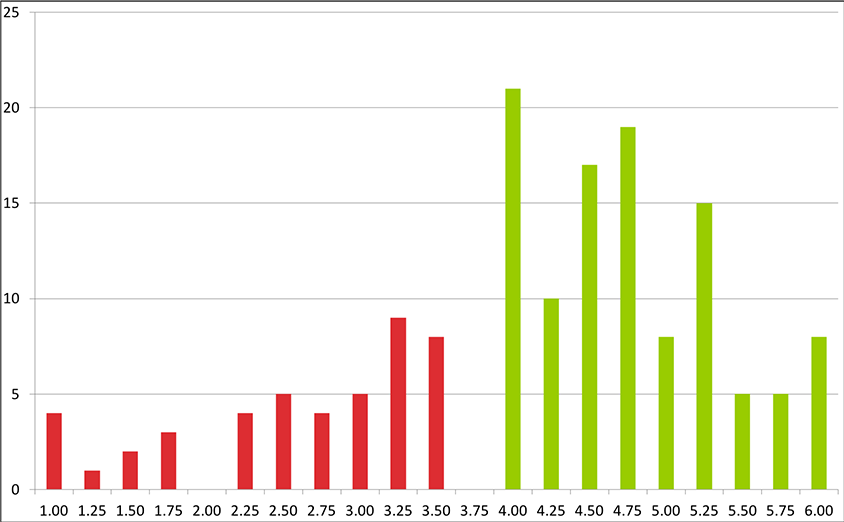Department of Computer Science | Institute of Theoretical Computer Science
Department of Computer Science | Institute of Theoretical Computer Science
Exam Statistics (Mar, 2018)

For questions on exercises use the forums on moodle. For administrative questions or for reporting technical problems (with moodle or the judge), use algolab@lists.inf.ethz.ch.
Prof. Angelika Steger, Prof. Emo Welzl, Prof. Peter Widmayer
Dr. Luis F. Barba Flores, Dr. Hafsteinn Einarsson, Daniel Graf, Dr. Michael Hoffmann, Petar Ivanov, Miloš Trujić, Felix Weissenberger, Manuel Wettstein
Tutorials: Wednesday, 17-19, CAB G 61 (first tutorial: Sep 20, 2017)
Problem of the week: Monday, 17-19, CAB H 56, CAB H 57, HG E 26.1, or anywhere else (first PotW: Sep 25, 2017)
Consulting hours: Wednesday, 19-, CAB G 61 (after the tutorial)
see also: vvz.ethz.ch
The objective of this course is to learn how to solve a problem given by a textual description. This includes appropriate problem modeling, choice of suitable algorithms, and a working implementation in C++.
In this course students learn how to solve algorithmic problems given by a textual, story-like description. We assume knowledge of elementary algorithms and data structures as they are typically taught on the Bachelor level. In tutorials we introduce more advanced algorithms and the usage of some standard libraries for combinatorial algorithms. Students practice their skills by solving weekly exercises. For that they have to understand the problem setting, find an appropriate modeling, choose suitable algorithms, and implement them using C/C++, STL, BGL, and CGAL. The evaluation of the correctness and efficiency of their solutions will be performed by an online-judge which compiles the submitted source-code and runs it on a set of test instances.
This course is a lab: Most of the time is spent working individually on the given problems.
In addition there is a weekly tutorial. These tutorials are not lectures in the classical sense. In particular we will not present theory and proofs there. Instead we rely on the corresponding knowledge gained during your Bachelor studies. The tutorials serve
Occasionally we will work with algorithms and data structures that the students may not have encountered during their Bachelor studies. Such algorithms and data structures will be properly introduced in the tutorials, with a focus on applications rather than on the underlying theory.
Every Wednesday after the tutorial we will hand out problem sets. The students hand in their solutions, using the online-judge, within one week.
Every Monday at 17:00 we post one problem as a "Problem of the Week". In order to score points for this problem, only solutions that are submitted within the following two hours are counted. The goal of this setup is to make students accustomed to exam conditions and provide an early feedback of where they stand.
Finally, the assistants will be available for consulting hours every Wednesday after the tutorial. These offer a place to ask questions and get help if you lack a necessary idea to solve a problem or if you struggle with any other kind of course related problem.
The grade of the course is solely based on the final exam. The exam takes place in a computer room, on two different days, 6 hours each, during the examination session. On both days you have to solve problems similar to those given during the semester.
Please consult our technical FAQ to learn more about